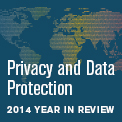The California Consumer Privacy Act (CCPA) requires businesses who engage in sales of personal information, to offer consumers the right to opt out of such sales through a “Do Not Sell My Personal Information” link or button on their websites. These “Do Not Sell” obligations present a particularly thorny question for businesses that participate in a digital ad exchange or otherwise use advertising tracking technologies on their websites. Because data elements such as IP address, cookie ID, device identifier and browsing history are considered “personal information” for purposes of the CCPA, the question is: does sharing that information with third-party ad tech providers constitute a “sale” of data?
The answer, so far, is a resounding “maybe.” In what follows, we expand on the issue and survey different approaches to this hotly contested question.
Why the Debate?
The CCPA defines a “sale” as “selling, renting, releasing, disclosing, disseminating, making available, transferring, or otherwise communicating orally, in writing, or by electronic or other means, a consumer’s personal information by the business to another business or a third party for monetary or other valuable consideration.” The Network Advertising Initiative (NAI) broke this definition down into three main elements that, when satisfied, might make the case that digital advertising involves a “sale.”
-
- The digital advertising must involve “personal information.” We know that it does because serving digital ads requires, at the very least, access to IP address and browsing history.
- The digital advertising must involve the movement of personal information from a business to another business or third party. This is often true for digital advertising relationships, as ad tech intermediaries and other participants in the ad exchange often use the personal information they have received from businesses for their own purposes, thus taking many ad tech entities outside of CCPA’s “service provider” safe harbor.
- The digital advertising must involve the exchange of monetary or other valuable consideration for the personal information. This is a fact-specific inquiry that will vary across contractual arrangements. For that reason, the NAI analysis states it would be difficult to broadly categorize all digital advertising activities as “sales.” However, the NAI cautions that if the recipients of personal information can retain the information “for profiling or segmenting purposes” (e.g., the ability to monetize the data independently), that could be evidence of a “sale” of data.
read more

 Subscribe
Subscribe


